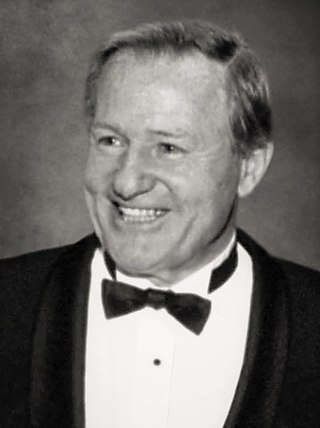
Graeme Ernest Lee MNZM JP (born 1 September 1935) is a former New Zealand politician. Originally a National Party MP, he broke away to found the Christian Democrat Party.

Graeme Ernest Lee MNZM JP (born 1 September 1935) is a former New Zealand politician. Originally a National Party MP, he broke away to found the Christian Democrat Party.
Lee was born in Paeroa on 1 September 1935, the son of Ernest Walter Lee and Muriel Myrtle Lee (née Weight). [1] [2] [3] His father was a builder, and later served as mayor of Paeroa from 1959. [4]
| Years | Term | Electorate | Party | ||
|---|---|---|---|---|---|
| 1981 –1984 | 40th | Hauraki | National | ||
| 1984 –1987 | 41st | Hauraki | National | ||
| 1987 –1990 | 42nd | Coromandel | National | ||
| 1990 –1993 | 43rd | Coromandel | National | ||
| 1993 –1994 | 44th | Matakana | National | ||
| 1994–1996 | Changed allegiance to: | Christian Democrats | |||
Lee was first elected to Parliament in the 1981 election, winning the seat of Hauraki as the National candidate. Lee replaced Leo Schultz, a prominent National MP. He retained his seat from then until the 1996 election, although a change of electoral boundaries resulted in the seat which covered the Thames-Coromandel district being renamed Coromandel in 1996.
Lee, a principally conservative member of the National Party caucus would later come to believe that the National Party was drifting away from conservatism, but initially resolved to fight the shift from within the party. After a three year period as a Cabinet Minister in the Bolger government, Lee resigned from the National Party in 1993. [5]
Lee had a reputation as one of the more conservative MPs in Parliament, and was particularly active in opposing Fran Wilde's homosexual law reform bill.
At first, it was thought likely that Lee would join the Christian Heritage Party, but talks between Lee and Christian Heritage broke down. An important issue was that of "confessionalism": Lee, while strongly believing in Christian teachings as a basis for morality, believed that anyone who shared the proper principles should be allowed to contribute, even if they were not actually Christian. The Christian Heritage Party, being strongly confessionalist, rejected this, saying that it was only logical that a Christian party should bar non-Christians from membership. This issue, as well as a number of smaller points, caused Lee to turn away from Christian Heritage and establish his own party in 1994. Lee initially called his group the United Progressive Party, but in 1995, it was relaunched as the Christian Democrats.
Sporadic talks with Christian Heritage continued, with many Christian activists putting pressure on both sides to unify. [6] Eventually, in late 1995, the Christian Coalition was established. In the 1996 election, however, the Coalition narrowly missed out on entering Parliament. It later collapsed amid many accusations and recriminations.
In the 1997 Queen's Birthday Honours, Lee was appointed a Member of the New Zealand Order of Merit, for public services. [7]
Lee had told his family that if he failed to remain in Parliament, he would retire from politics. After his departure from politics, he became involved as CEO for the Christian housing provider Habitat for Humanity and wrote an autobiography about his religious views and political life within the National and Christian Democrat parties, as well as his ongoing political stance. For his current organisational affiliation, see concluding paragraph and links section.
The party then renamed itself Future New Zealand and contested the 1999 elections. It later merged with Peter Dunne's United Party to form United Future New Zealand in 2000. The party received 8 seats at the 2002 election. However, most New Zealanders realised that this was merely a cosmetic change during the 47th New Zealand Parliament, with most of the caucus professing either fundamentalist Protestant or conservative Catholic religious beliefs.
Graeme Lee was a minister at Auckland's Greenlane Christian Centre for a brief period of time, and was also one of the co-ordinators of Vision New Zealand, a national evangelical/ecumentalist umbrella group. Subsequently, Lee was involved in organising the New Zealand itinerary of a American televangelist, Greg Laurie, in 2011.
He has been leading the New Zealand branch of Christians for Israel, a Christian Zionist group.
His daughter, Denise Krum, stood for United Future in the 2008 general election. However, UFNZ Leader Peter Dunne was the only UFNZ MP returned to Parliament, due to his anchoring constituency seat. Krum joined the National Party in 2009, becoming a deputy chair of the Northern Region. She unsuccessfully applied to become National Party candidate for the Epsom electorate, but became a National Party List MP candidate at the 2011 New Zealand general election. However, she was ranked at 69 on the National Party list and consequently did not enter Parliament. Krum later ran successfully for the Auckland Council and was elected Councillor in 2013 for the Maungakiekie-Tamaki Ward. [8] [ better source needed ]

The Christian Heritage Party of New Zealand was a New Zealand political party espousing Christian values and conservative views on social policy. Although it never won seats in an election, it came close to doing so in 1996 as part of the Christian Coalition and briefly had a member in Parliament.
The Alliance was a left-wing political party in New Zealand. It was formed at the end of 1991 by the linking of four smaller parties. The Alliance positioned itself as a democratic socialist alternative to the centre-left New Zealand Labour Party. It was influential throughout the 1990s, but suffered a major setback after its founder and leader, Jim Anderton, left the party in 2002, taking with him several of its members of parliament (MPs). After the remaining MPs lost their seats in the 2002 general election, some commentators predicted the demise of the party.

The 1999 New Zealand general election was held on 27 November 1999 to determine the composition of the 46th New Zealand Parliament. The governing National Party, led by Prime Minister Jenny Shipley, was defeated, being replaced by a coalition of Helen Clark's Labour Party and the smaller Alliance. This marked an end to nine years of the Fourth National Government, and the beginning of the Fifth Labour Government which would govern for nine years in turn, until its loss to the National Party in the 2008 general election. It was the first New Zealand election where both major parties had female leaders.
United Future New Zealand, usually known as United Future, was a centrist political party in New Zealand. The party was in government between 2005 and 2017, first alongside Labour (2005–2008) and then supporting National (2008–2017).

The 1987 New Zealand general election was a nationwide vote to determine the shape of the 42nd sitting of the New Zealand Parliament. The governing New Zealand Labour Party, led by Prime Minister David Lange, was re-elected for a second term, although the Opposition National Party made gains. The election also saw the elimination of the Democratic Party from Parliament, leaving Labour and National as the only parties represented.

United New Zealand was a centrist political party in New Zealand founded in 1995. It merged with the Christian-based Future New Zealand party to form the United Future New Zealand party in 2000.

The 1996 New Zealand general election was held on 12 October 1996 to determine the composition of the 45th New Zealand Parliament. It was notable for being the first election to be held under the new mixed-member proportional (MMP) electoral system, and produced a parliament considerably more diverse than previous elections. It saw the National Party, led by Jim Bolger, retain its position in government, but only after protracted negotiations with the smaller New Zealand First party to form a coalition. New Zealand First won a large number of seats—including every Māori electorate, traditionally held by Labour. Its position as "kingmaker", able to place either of the two major parties into government, was a significant election outcome.

The Christian Coalition was an Evangelical Christian political party operating in New Zealand. It was an alliance of the now-defunct Christian Heritage Party and the Christian Democrats, New Zealand's two theologically conservative Christian parties. The Christian Coalition did not meet with the success that it hoped for, and was eventually dissolved.

The 1993 New Zealand general election was held on 6 November 1993 to determine the composition of the 44th New Zealand Parliament. Voters elected 99 members to the House of Representatives, up from 97 members at the 1990 election. The election was the last general election to use the first-past-the-post electoral system, with all members elected from single-member electorates.

This article discusses Christian politics in New Zealand.
The Christian Democrat Party of New Zealand was a Christian socially conservative political party established in 1995. It contested the 1996 general election as part of the Christian Coalition with the Christian Heritage Party.
Frank Grover is a former New Zealand politician. He was an MP from 1996 to 1999, representing first the Alliance and then the Christian Heritage Party in the House of Representatives.

The 44th New Zealand Parliament was a term of the Parliament of New Zealand. Its composition was determined by the 1993 elections, and it sat until the 1996 elections.

Richard John Northey is a New Zealand politician. He was an MP from 1984 to 1990, and again from 1993 to 1996. He served on the Auckland Council between 2010 and 2013, and is a member of the Labour Party.
Katrina May Shanks is a former New Zealand politician who was a list member of parliament for the National Party from 2007 to 2014.

Coromandel is a New Zealand electoral division returning one member to the House of Representatives. It is currently represented by Scott Simpson, a member of the National Party.
Gary Thomas Knapp is a former New Zealand politician of the Social Credit Party.

The 2011 New Zealand general election took place on Saturday 26 November 2011 to determine the membership of the 50th New Zealand Parliament.
Matakana is a former New Zealand parliamentary electorate in the Thames-Coromandel District, which existed for one parliamentary term from 1993 to 1996, and was held by Graeme Lee. In 1994, Lee defected from the National Party to the Christian Democrat Party.
Denise Adrienne Lee is a New Zealand politician who was the National Party's Member of Parliament for the Maungakiekie electorate from 2017 to 2020. She was previously an Auckland Council local body councillor.